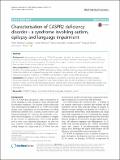Characterisation of CASPR2 deficiency disorder - a syndrome involving autism, epilepsy and language impairment
Abstract
Background: Heterozygous mutations in CNTNAP2 have been identified in patients with a range of complex phenotypes including intellectual disability, autism and schizophrenia. However heterozygous CNTNAP2 mutations are also found in the normal population. Conversely, homozygous mutations are rare in patient populations and have not been found in any unaffected individuals. Case presentation: We describe a consanguineous family carrying a deletion in CNTNAP2 predicted to abolish function of its protein product, CASPR2. Homozygous family members display epilepsy, facial dysmorphisms, severe intellectual disability and impaired language. We compared these patients with previously reported individuals carrying homozygous mutations in CNTNAP2 and identified a highly recognisable phenotype. Conclusions: We propose that CASPR2 loss produces a syndrome involving early-onset refractory epilepsy, intellectual disability, language impairment and autistic features that can be recognized as CASPR2 deficiency disorder. Further screening for homozygous patients meeting these criteria, together with detailed phenotypic and molecular investigations will be crucial for understanding the contribution of CNTNAP2 to normal and disrupted development.
Citation
Rodenas-Cuadrado , P , Pietrafusa , N , Francavilla , T , La Neve , A , Striano , P & Vernes , S C 2016 , ' Characterisation of CASPR2 deficiency disorder - a syndrome involving autism, epilepsy and language impairment ' , BMC Medical Genetics , vol. 17 , 8 . https://doi.org/10.1186/s12881-016-0272-8
Publication
BMC Medical Genetics
Status
Peer reviewed
ISSN
1471-2350Type
Journal article
Description
This work was supported by a Marie Curie Career Integration Grant awarded to S.C.V. and by the Max Planck Society. We are grateful to the family for their consent in undertaking this study.Collections
Items in the St Andrews Research Repository are protected by copyright, with all rights reserved, unless otherwise indicated.
Related items
Showing items related by title, author, creator and subject.
-
Next-gen sequencing identifies non-coding variation disrupting miRNA-binding sites in neurological disorders
Devanna, P; Chen, X S; Ho, J; Gajewski, D; Smith, S D; Gialluisi, A; Francks, C; Fisher, S E; Newbury, D F; Vernes, S C (2018-05) - Journal articleUnderstanding the genetic factors underlying neurodevelopmental and neuropsychiatric disorders is a major challenge given their prevalence and potential severity for quality of life. While large-scale genomic screens have ... -
Giardia secretome highlights secreted tenascins as a key component of pathogenesis
Dubourg, Audrey; Xia, Dong; Winpenny, John P; Al Naimi, Suha; Bouzid, Maha; Sexton, Darren W; Wastling, Jonathan M; Hunter, Paul R; Tyler, Kevin M (2018-03) - Journal articleBackground: Giardia is a protozoan parasite of public health relevance that causes gastroenteritis in a wide range of hosts. Two genetically distinct lineages (assemblages A and B) are responsible for the human disease. ... -
Discovery of the first genome-wide significant risk loci for attention deficit/hyperactivity disorder
ADHD Working Group of the Psychiatric Genomics Consortium (PGC); Early Lifecourse & Genetic Epidemiology (EAGLE) Consortium; 23andMe Research Team; Kent, Lindsey (2019-01) - Journal articleAttention deficit/hyperactivity disorder (ADHD) is a highly heritable childhood behavioral disorder affecting 5% of children and 2.5% of adults. Common genetic variants contribute substantially to ADHD susceptibility, but ...

